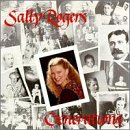| All Artists: Sally Rogers Title: Generations Members Wishing: 1 Total Copies: 0 Label: Flying Fish Records Release Date: 9/29/1992 Genres: Folk, Pop Styles: Traditional Folk, Contemporary Folk Number of Discs: 1 SwapaCD Credits: 1 UPCs: 018964049324, 018964049348 |
Search - Sally Rogers :: Generations
 | Sally Rogers Generations Genres: Folk, Pop
|
Larger Image |
CD Details |
CD ReviewsSally forward Gregor von Kallahann | 02/21/2001 (4 out of 5 stars) "Sally Rogers has been around since the mid-70s, singing and recording traditional music and her own folk influenced compositions. When not performing solo, she occasionally duets with fellow folk diva, Claudia Schmidt, or with her husband, Howie Bursen--to say nothing of her collaborations with Rob Petrie and Buddy Sorrell. (Whoops, strike that last bit, wrong Sally Rogers!)_Generations_ is a good example of what she does best. She has a lovely, unadorned alto, which she occasionally doubletracks to good effect. She is also a fine instrumentalist (demonstrated by the two instrumental tracks on this album). And she's a subtle interpreter. She can pull off adopting the persona of a 19th Century British girl, slaving away in the coal mines, or even more dauntingly, that of the freed American slave, Sojourner Truth ("Ain't I A Woman"). And she can allow herself to get just a little chanteuse-y on Bonnie Koloc's "I'll Still Be Loving You" (a real crowd pleaser in concert).In her liner notes, Rogers writes that this record seemed to be all about women, without adopting an overtly feminist stance. In 1989, when this was recorded, it was becoming clear that it was possible to be a feminist folk artist and still permit yourself to write a frankly gushy song like "I'll be There" dedicated to one's husband. Though not nearly as bold musically, there is something about Rogers' sensibility that reminds me of mid-70s Laura Nyro, a mix of modern feminism and ancient wisdom, domesticity and flight, community and solitary reflectiveness.Like many folk artists of the 70s and 80s, she can be a little earnest at times. She re-words songs like Jean Ritchie's "Peace Round," changing "children of all men" to "children of the earth." But then this was before "political correctness" was so roundly mocked. In person, she is anything but humorless (it should be stressed). But on the solemnity front, I give her credit for her understated version of "Dead Girl of Hiroshima" (aka "I Come and Stand at Every Door" when the Byrds did it in 1965). What could have been mawkish is rendered quietly moving. It closes the album on a near-perfect note."
|

 Track Listings (12) - Disc #1
Track Listings (12) - Disc #1